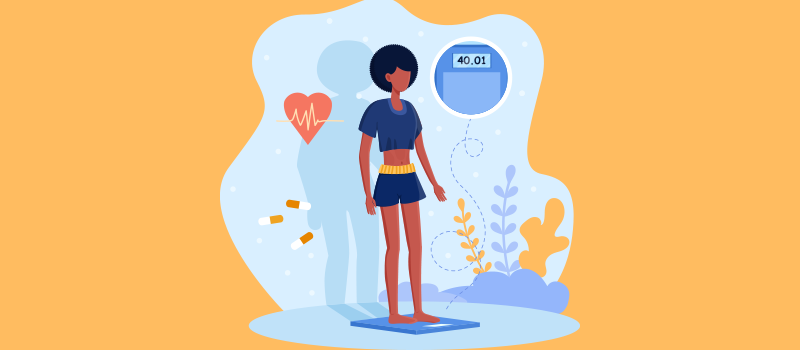What’s the Buzz
The Bee Healthy Blog
Can Medication Help Treat an Eating Disorder?

There is a common misconception that eating disorders are lifestyle choices. The truth is that eating disorders are mental health conditions related to a person’s thoughts, emotions, and eating behaviors. Although challenging, it is possible to treat eating disorders with a combination of psychotherapy, nutrition education, and sometimes, medications. If you or a loved one is struggling with an eating disorder, please keep reading. In this article, we’ll talk about some of the medications used to treat common eating disorders like anorexia nervosa, bulimia nervosa, and binge eating disorder.
Are medications effective for anorexia and other eating disorders?
There is no straightforward answer to this question. While many mental health disorders can be successfully treated with medicines, eating disorders are less responsive to pharmacological treatment. However, there are medications that can be helpful in treating eating disorders and other co-occurring psychological symptoms.
In general, doctors take a multidisciplinary approach to treat eating disorders. Ideally, the treatment team includes a psychiatrist, a therapist, a medical doctor, and a dietician. Nutrition education, family involvement, and support networks play important roles in recovery from eating disorder symptoms. Rewarding changes in behavior and following a treatment plan consistently have also been found to be very effective.
Among the various therapy approaches, the maximum evidence is available for cognitive behavioral therapy (CBT). CBT can help people with eating disorders control their obsessive thinking about food, body weight, and shape while maintaining normal eating patterns.
What class of medication is best for anorexia nervosa?
No single medication on its own is effective in treating anorexia nervosa. The American Psychiatric Association (APA) says that medication treatment should not be the only or primary treatment approach for anorexia nervosa. Rather, eating disorder treatment should be interdisciplinary, including education, monitoring, and psychotherapies such as cognitive behavior therapy and family therapy.
However, medications can be considered to prevent relapse in anorexic patients who have achieved weight gain and are at a healthy weight. These medicine classes can also be used to treat co-occurring conditions such as depression, obsessive-compulsive disorder, or panic disorders.
For example, anti-anxiety medications can be helpful in weight restoration in anorexic individuals who suffer from anxiety before meals.
Olanzapine (Zyprexa®), an antipsychotic drug typically used to treat schizophrenia and bipolar disorder, is also effective in treating anorexia. It can stimulate appetite and help people with severe anorexia gain weight.
What medications are used to treat bulimia?
Compared to anorexia, there are more medications available to treat bulimia nervosa. It is believed these drug classes work by affecting the same brain chemical responsible for depressive symptoms in the central nervous system.
SSRI Antidepressants
Various studies and clinical trials have shown that a selective serotonin reuptake inhibitor (SSRI) called fluoxetine (Prozac®) can help treat bulimia nervosa. Treatment of bulimia with fluoxetine can reduce binge eating and vomiting by 50-60%.
Other Antidepressant Medications
Tricyclic antidepressants, such as imipramine (Tofranil®), desipramine (Norpramin®), and amitriptyline (Elavil®), are also effective in treating bulimia. Phenelzine (Nardil®) and other monoamine oxidase inhibitors (an older class of antidepressants) are also used to treat bulimia.
Anti-Anxiety Medications
The anti-anxiety medication buspirone (Buspar®) can be used to successfully treat bulimia nervosa. It helps decrease binge eating and vomiting in bulimia patients.
Anti-Nausea Medications
Some studies have shown that ondansetron (Zofran®), an anti-nausea and anti-vomiting medication, may be an effective bulimia medication. It can help reduce binge eating and self-induced vomiting in people with bulimia nervosa.
What medications are used to treat binge eating disorders?
Various drug classes are helpful in treating binge eating disorder, including SSRIs, anticonvulsants, and appetite suppressants. The most promising among these is topiramate (Topamax®), an anticonvulsant drug that can significantly reduce binge frequency and help control weight gain.
Another medication, lisdexamfetamine dimesylate (Vyvanse®), is the first drug approved by the Food and Drug Administration (FDA) for binge eating disorders in adults. This medication is commonly used to treat ADHD (attention deficit hyperactivity disorder). It is believed that this medication helps control impulsive behaviors that lead to binge eating and weight gain.
Doctors also use certain medications “off-label” to treat binge eating disorders. Meaning that while the FDA does not approve these medicines to treat binge eating, a physician can prescribe them for this medical condition if it is deemed to be beneficial for the patients. Medications like selective serotonin reuptake inhibitors (SSRIs), tricyclic antidepressants (TCAs), bupropion (Wellbutrin®), and the anti-seizure drug topiramate (Topamax®) may be used off-label for this purpose.
Is there medication to curb appetite?
Appetite suppressants, also called weight loss medications or diet pills, can help control hunger, affect your urge to eat and make you feel full more quickly after eating less food. As a result, you consume fewer calories and lose weight. The Food and Drug Administration has approved several medications for this purpose, such as phentermine (Pro-Fast®), phentermine/topiramate (Qsymia®), phendimetrazine (Prelu-2®), liraglutide (Saxenda®), diethylpropion (Tenuate dospan®), and naltrexone-bupropion (Contrave®). These are prescription medications and should only be taken under the supervision of a healthcare provider.
Medications for Eating Disorders: The Takeaway
Eating disorder treatment varies according to what type of eating disorder you have - the most common ones being anorexia nervosa, bulimia nervosa, and binge eating disorder. Treatment for your eating disorder will also depend on other co-occurring conditions. For example, if you have depression, your doctor may choose a medication used to treat depression and is also effective in treating eating disorders.
You will likely be prescribed a combination of psychotherapy, nutrition education, and medications to help you recover from an eating disorder. The important thing to know is that it is possible to manage your symptoms, maintain a healthy weight, and ensure good physical and mental health with a systematic and evidence-based approach to eating disorder treatment.
References

SOCIAL